Shiloh with Don Henley
After spotlighting the pre-Eagles work of the late Glenn Frey, I also wanted to talk about the early band of Frey’s Eagles co-founder Don Henley. Before Frey and Henley met, Henley played drums and sang lead vocals for a Texas band called Shiloh. Shiloh recorded one self-titled album in 1970, and it was released on the same label – Amos Records – which distributed the sole album of Frey’s early duo Longbranch/Pennywhistle.
During the ‘60’s, Henley and other members of Shiloh had previously played together in at least two other bands. The first of these was the Four Speeds (no relation to the Gary Usher surf-rock band of the same name). Henley and two other future Shiloh members – bassist Richard Bowden and keyboard/trumpet player Jerry Surratt – were in this band, along with original guitarist Freddie Neese. These four teenagers cut two singles in 1964, “Variety” and “Why Did You Leave Me”, both of which were decent Texas-style garage rock songs that would fit in on a Nuggets box set. Henley sang the lead vocals on both, although he sounded little like his future self. The B-sides of both singles are offbeat instrumentals: “El Santa” mixes “Santa Claus Is Coming To Town” with “Tequila”; “Bedrock” is derived from Henry Mancini’s Peter Gunn theme.
The band recorded their next single in 1967 under the name The Felicity. Richard Bowden switched to lead guitar after Neese’s departure, and his cousin Mike Bowden took on the bass duties. This single offers more sophisticated songs on the order of the Young Rascals, with vocals by Henley. The A-side “Hurtin” spells out the intended emotion. Surratt’s keyboards create a fairly effective mood, but it’s Henley’s vocal that makes the song ache. The B-side, “I’ll Try It”, was penned by Henley, and is the better track, presenting a more subtle melancholy feeling behind a jangly guitar sound. Good stuff.
The band then changed their name to Shiloh, and recorded a single in 1969 under that name before recording their full-length album. That inauspicious single offered two bland soft-rock tracks – “Jennifer (O’ My Lady)” on the A-side, “Tell Me To Get Out Of Your Life” on the B-side – built on piano and strings. The single was produced by Kenny Rogers, during his time with The First Edition.
Tragically, Jerry Surratt died in a motorcycle accident in March of 1970. Henley and the Bowdens soon regrouped, joined by journeyman steel guitar player Al Perkins and future country record producer Jim Ed Norman (who replaced Surratt as their keyboardist). This five-man country-rock band recorded the self-titled Shiloh album in 1970, under the continued production guidance of Kenny Rogers.
The album's high points are three enthusiastic roots-rock numbers reminiscent of The Band (“Swamp River Country”, “Left My Gal In The Mountains”, “Simple Little Down Home Rock & Roll Love Song For Rosie”). Logically enough, the album's three Henley-penned country-rock tracks (“I’m Gone”, “Same Old Story”, “God Is Where You Find Him”) bear some resemblance to songs that he would later help create with the Eagles, albeit without the California vibe. Of those three, the six-minute closing ballad “God Is Where You Find Him” is the most satisfying. Perkins’ arrangement of the traditional “Railroad Song” also has something of a proto-Eagles sound. Additionally, the album contains a serene steel guitar instrumental (“Du Raison”), as well as two tongue-in-cheek country ditties (“It’s About Time”, “Down On The Farm”) written and sung by Richard Bowden – foretokening his future as one-half of the country-comedy duo Pinkard & Bowden. Although Rogers' production gives the varied album a general feeling of consistency, the whole of Shiloh is somehow less than the sum of its parts, preventing the band from cementing their own place among country-rock's founding fathers. It’s a pleasant album, to be sure, but not a particularly seminal one. However, it may be an essential find for Henley fans, Eagles completists, and country-rock connoisseurs.
Shiloh has been out of print for decades. Its distributor, Amos Records, went out of business in 1971, and the album has never received an American reissue. However, it was released on CD in South Korea in 2014 by the Big Pink label.
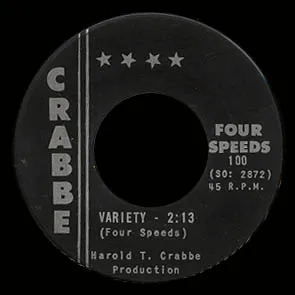
Four Speeds "Variety" b/w "El Santa" (Crabbe single 100) 1964
Track Listing:
a. Variety
b. El Santa
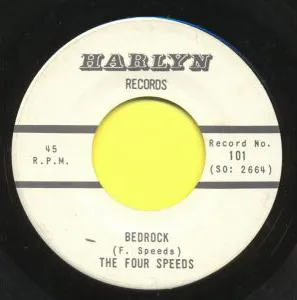
Four Speeds "Why Did You Leave Me" b/w "Bedrock" (Harlyn single 101) 1964
Track Listing:
a. Why Did You Leave Me
b. Bedrock
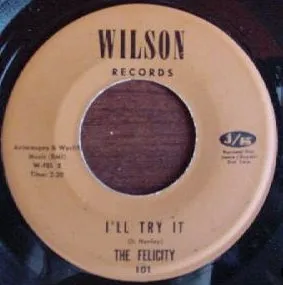
The Felicity "Hurtin" b/w "I’ll Try It" (Wilson single 101) 1967
Track Listing:
a. Hurtin
b. I’ll Try It
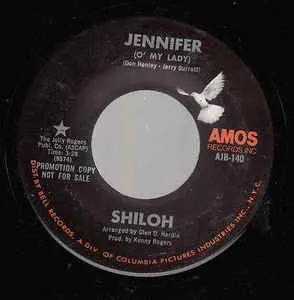
Shiloh “Jennifer (O’ My Lady)” b/w “Tell Me To Get Out Of Your Life” (Amos single AJB-140) 1969
a. Jennifer (O’ My Lady)
b. Tell Me To Get Out Of Your Life
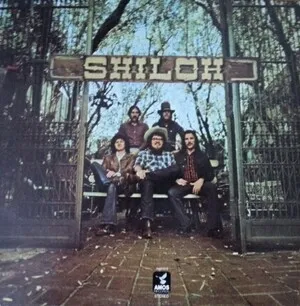
Shiloh "Shiloh" (Amos AAS 7015) 1970
Track Listing:
1. Simple Little Down Home Rock & Roll Love Song For Rosie
2. I'm Gone
3. Left My Gal In The Mountains
4. It's About Time
5. Swamp River Country
6. Railroad Song
7. Same Old Story
8. Du Raison
9. Down On The Farm
10. God Is Where You Find Him
During the ‘60’s, Henley and other members of Shiloh had previously played together in at least two other bands. The first of these was the Four Speeds (no relation to the Gary Usher surf-rock band of the same name). Henley and two other future Shiloh members – bassist Richard Bowden and keyboard/trumpet player Jerry Surratt – were in this band, along with original guitarist Freddie Neese. These four teenagers cut two singles in 1964, “Variety” and “Why Did You Leave Me”, both of which were decent Texas-style garage rock songs that would fit in on a Nuggets box set. Henley sang the lead vocals on both, although he sounded little like his future self. The B-sides of both singles are offbeat instrumentals: “El Santa” mixes “Santa Claus Is Coming To Town” with “Tequila”; “Bedrock” is derived from Henry Mancini’s Peter Gunn theme.
The band recorded their next single in 1967 under the name The Felicity. Richard Bowden switched to lead guitar after Neese’s departure, and his cousin Mike Bowden took on the bass duties. This single offers more sophisticated songs on the order of the Young Rascals, with vocals by Henley. The A-side “Hurtin” spells out the intended emotion. Surratt’s keyboards create a fairly effective mood, but it’s Henley’s vocal that makes the song ache. The B-side, “I’ll Try It”, was penned by Henley, and is the better track, presenting a more subtle melancholy feeling behind a jangly guitar sound. Good stuff.
The band then changed their name to Shiloh, and recorded a single in 1969 under that name before recording their full-length album. That inauspicious single offered two bland soft-rock tracks – “Jennifer (O’ My Lady)” on the A-side, “Tell Me To Get Out Of Your Life” on the B-side – built on piano and strings. The single was produced by Kenny Rogers, during his time with The First Edition.
Tragically, Jerry Surratt died in a motorcycle accident in March of 1970. Henley and the Bowdens soon regrouped, joined by journeyman steel guitar player Al Perkins and future country record producer Jim Ed Norman (who replaced Surratt as their keyboardist). This five-man country-rock band recorded the self-titled Shiloh album in 1970, under the continued production guidance of Kenny Rogers.
The album's high points are three enthusiastic roots-rock numbers reminiscent of The Band (“Swamp River Country”, “Left My Gal In The Mountains”, “Simple Little Down Home Rock & Roll Love Song For Rosie”). Logically enough, the album's three Henley-penned country-rock tracks (“I’m Gone”, “Same Old Story”, “God Is Where You Find Him”) bear some resemblance to songs that he would later help create with the Eagles, albeit without the California vibe. Of those three, the six-minute closing ballad “God Is Where You Find Him” is the most satisfying. Perkins’ arrangement of the traditional “Railroad Song” also has something of a proto-Eagles sound. Additionally, the album contains a serene steel guitar instrumental (“Du Raison”), as well as two tongue-in-cheek country ditties (“It’s About Time”, “Down On The Farm”) written and sung by Richard Bowden – foretokening his future as one-half of the country-comedy duo Pinkard & Bowden. Although Rogers' production gives the varied album a general feeling of consistency, the whole of Shiloh is somehow less than the sum of its parts, preventing the band from cementing their own place among country-rock's founding fathers. It’s a pleasant album, to be sure, but not a particularly seminal one. However, it may be an essential find for Henley fans, Eagles completists, and country-rock connoisseurs.
Shiloh has been out of print for decades. Its distributor, Amos Records, went out of business in 1971, and the album has never received an American reissue. However, it was released on CD in South Korea in 2014 by the Big Pink label.
Four Speeds "Variety" b/w "El Santa" (Crabbe single 100) 1964
Track Listing:
a. Variety
b. El Santa
Four Speeds "Why Did You Leave Me" b/w "Bedrock" (Harlyn single 101) 1964
Track Listing:
a. Why Did You Leave Me
b. Bedrock
The Felicity "Hurtin" b/w "I’ll Try It" (Wilson single 101) 1967
Track Listing:
a. Hurtin
b. I’ll Try It
Shiloh “Jennifer (O’ My Lady)” b/w “Tell Me To Get Out Of Your Life” (Amos single AJB-140) 1969
a. Jennifer (O’ My Lady)
b. Tell Me To Get Out Of Your Life
Shiloh "Shiloh" (Amos AAS 7015) 1970
Track Listing:
1. Simple Little Down Home Rock & Roll Love Song For Rosie
2. I'm Gone
3. Left My Gal In The Mountains
4. It's About Time
5. Swamp River Country
6. Railroad Song
7. Same Old Story
8. Du Raison
9. Down On The Farm
10. God Is Where You Find Him
Comments
https://www.amazon.com/Shiloh-Limited/dp/B00LPCTBL6/ref=sr_1_fkmrnull_1?crid=1AQBTX7013O9V&keywords=shiloh+don+henley&qid=1558409704&s=gateway&sprefix=shiloh+don%2Caps%2C144&sr=8-1-fkmrnull